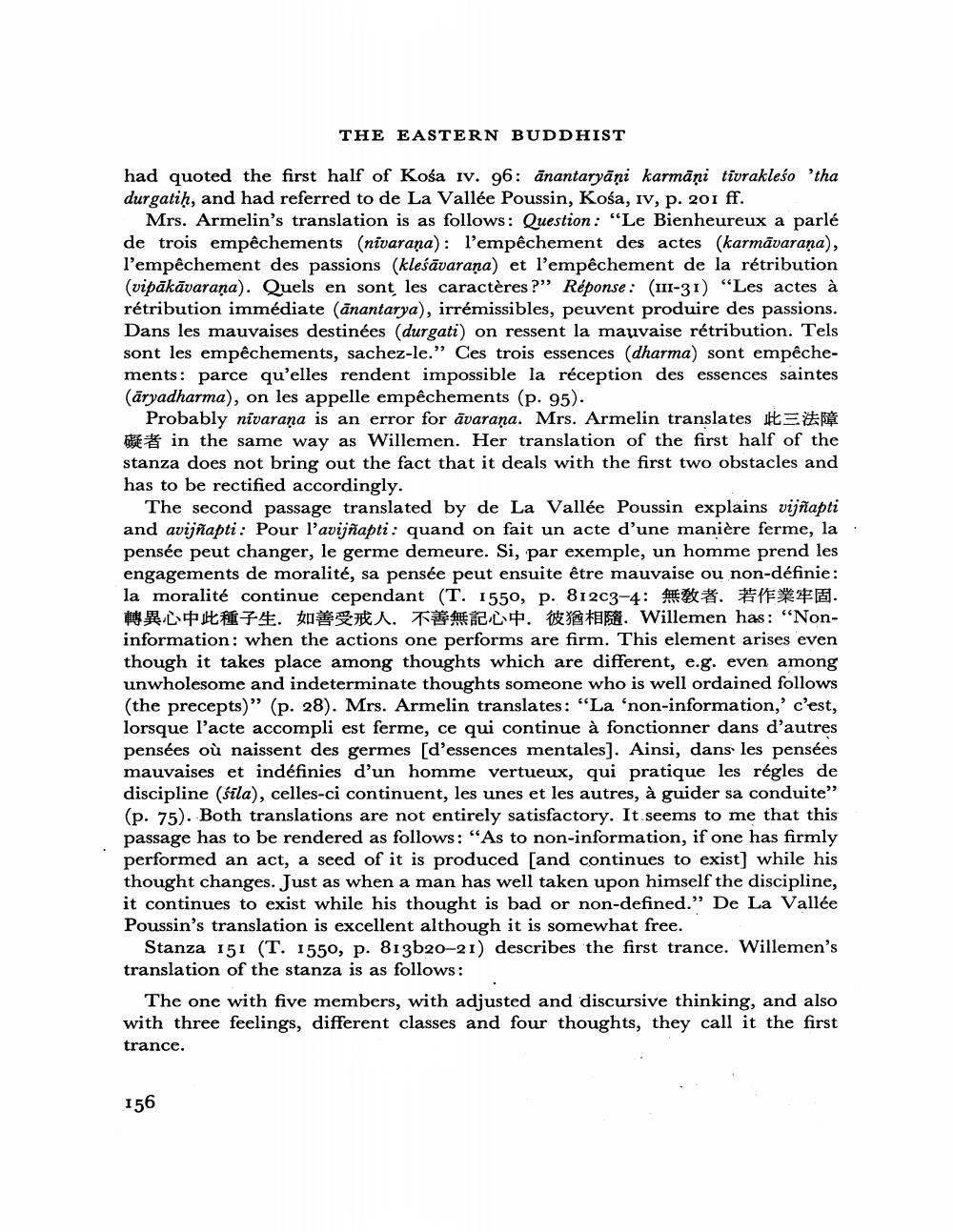Book Title: Book Reviews Author(s): J W De Jong Publisher: J W De Jong View full book textPage 6
________________ THE EASTERN BUDDHIST had quoted the first half of Kośa iv. 96: ānantaryāṇi karmāņi tivrakleso 'tha durgatiḥ, and had referred to de La Vallée Poussin, Kośa, iv, p. 201 ff. Mrs. Armelin's translation is as follows: Question: "Le Bienheureux a parlé de trois empêchements (nivaraņa): l'empêchement des actes (karmāvaraņa), l'empêchement des passions (kleśāvarana) et l'empêchement de la rétribution (vipākāvarana). Quels en sont les caractères ?” Réponse : (111-31) "Les actes à rétribution immédiate (anantarya), irrémissibles, peuvent produire des passions. Dans les mauvaises destinées (durgati) on ressent la mauvaise rétribution. Tels sont les empêchements, sachez-le.” Ces trois essences (dharma) sont empêchements: parce qu'elles rendent impossible la réception des essences saintes (āryadharma), on les appelle empêchements (p. 95). Probably nivarana is an error for āvarana. Mrs. Armelin translates HET one in the same way as Willemen. Her translation of the first half of the stanza does not bring out the fact that it deals with the first two obstacles and has to be rectified accordingly. The second passage translated by de La Vallée Poussin explains vijñapti and avijñapti: Pour l'avijñapti: quand on fait un acte d'une manière ferme, la : pensée peut changer, le germe demeure. Si, par exemple, un homme prend les engagements de moralité, sa pensée peut ensuite être mauvaise ou non-définie: la moralité continue cependant (T. 1550, p. 81203-4: * #EX . Pitill F. # . T* C*. 58. Willemen has: "Noninformation: when the actions one performs are firm. This element arises even though it takes place among thoughts which are different, e.g. even among unwholesome and indeterminate thoughts someone who is well ordained follows (the precepts)” (p. 28). Mrs. Armelin translates: “La 'non-information, c'est, lorsque l'acte accompli est ferme, ce qui continue à fonctionner dans d'autres pensées où naissent des germes [d'essences mentales]. Ainsi, dans les pensées mauvaises et indéfinies d'un homme vertueux, qui pratique les régles de discipline (śīla), celles-ci continuent, les unes et les autres, à guider sa conduite" (p. 75). Both translations are not entirely satisfactory. It seems to me that this passage has to be rendered as follows: "As to non-information, if one has firmly performed an act, a seed of it is produced (and continues to exist] while his thought changes. Just as when a man has well taken upon himself the discipline, it continues to exist while his thought is bad or non-defined.” De La Vallée Poussin's translation is excellent although it is somewhat free. Stanza 151 (T. 1550, p. 813b20-21) describes the first trance. Willemen's translation of the stanza is as follows: The one with five members, with adjusted and discursive thinking, and also with three feelings, different classes and four thoughts, they call it the first trance. 156Page Navigation
1 ... 4 5 6 7 8
